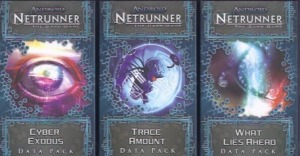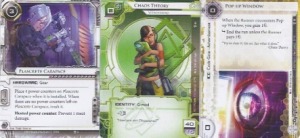Android: Netrunner Genesis Cycle (Game Review)

The first three Genesis Cycle packs
It’s been a year since I reviewed Android: Netrunner, so it’s past time for me to check in again. There has been a lot of new material for it, so the only reason for my lateness is that I lost interest. I found the base set to be a tense, varied game on its own with a lot of promise for the future. I’m just not the right person for collectable card games, though, even using the curated LCG model. I couldn’t keep up with it, and wonder whether Fantasy Flight’s expansions really kept improving the game.
So, the base game game out late last year. The first small expansion (“data pack”) was also released by the end of 2012. 2013 saw eight additional small expansions and one large one, with no sign of slowing down next year! I bought the first three packs in “the Genesis Cycle“, so this is nominally a review of those. But it probably applies to the many cards I haven’t seen, and to my take on LCGs in general.
 First of all, I question the cost. The point of a Living Card Game is that you have a known cost up front, because you buy sets with all the cards instead of buying random booster sets. But that doesn’t make it cheap by any means. These data packs retail for $15 each, and they provide three copies each of twenty different cards. That’s almost $1 for every new card type, and you’re not likely to use all the cards anyway.
First of all, I question the cost. The point of a Living Card Game is that you have a known cost up front, because you buy sets with all the cards instead of buying random booster sets. But that doesn’t make it cheap by any means. These data packs retail for $15 each, and they provide three copies each of twenty different cards. That’s almost $1 for every new card type, and you’re not likely to use all the cards anyway.
The triplicate cards are understandable, since a deck is allowed to contain up to three of each one. It was annoying that the base set didn’t have three copies of each one. On the other hand, each data set also includes a new faction card in triplicate, even though no game would ever use more than one! If you’re already wondering whether the expansion is worth the cost, it’s frustrating to get a couple cards that are impossible to ever use.
As far as the gameplay goes, they definitely add some new things. Corps now have Agendas that can be advanced beyond the minimum requirement for bonuses, and one Agenda changes the flow of the game by giving the player an extra action every turn. The new faction cards (“identities” of existing factions) feel balanced with new special powers that will change your considerations when building a deck. It’s not bad.
It’s not great, either, though. The three data packs I bought cost almost as much as the base game, and I certainly didn’t feel like they changed the game very much. The strongest new cards and combos are difficult to get, and I appreciate that Fantasy Flight does not seem to be ramping up the power to make expansions must haves. But the main change in the game’s feeling for me was a disappointing one: I’d appreciated how the base set made you work with a very limited selection of cards and factions with known weaknesses. Since Netrunner is fundamentally a bluffing game, this knowledge was part of the tension. Even with the limited data packs that I bought, the biggest holes have been filled (every Runner faction has icebreakers of each major type), and there are too many threats for you to feel like you’re able to guess at what your opponent might still have hidden.
I am used to expansions shaking up a game more, because I usually play board games. With those, it’s understood that an expansion will add new rules or make other significant changes. Since a collectable card game needs to stay consistent over the years, even if a player misses a couple sets, it doesn’t have the freedom to change the game as drastically. This added to the impression that I wasn’t getting a lot for the price of the new cards.
A lot of this is my own opinion, of course, and it’s coming from someone who has never stuck with a collectable game. I know that Netrunner is still a big hit in certain crowds. My perspective should be familiar to a lot of board gamers, though, and I do think that the flaws I see are legitimate. The expansions are detailed and maintain the game’s high quality (although I did think the flavor text was lacking, and the alleged theme running through each data pack felt weak). Overall, if you’re still playing this game a lot, buying these will be an easy decision. For me, though, I felt trapped between a good base game that wasn’t designed for long-term replayability on its own, and an expanded system that cost a lot of money without adding real changes.
Grade: C


